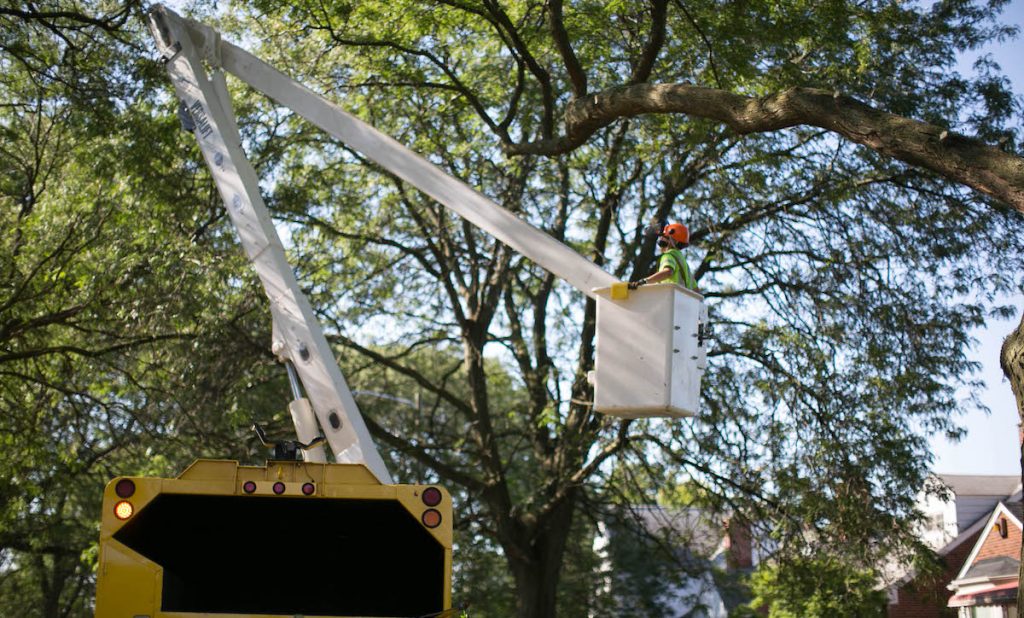Trees Return To Detroit, But Some Residents Are Skeptical
Detroit’s tree canopy was left unattended as the city struggled during the Great Recession. Now, residents are skeptical of renewed efforts to care for trees.

When Mayor Mike Duggan announced his “10,000 Up,10,000 Down” tree planting and removal campaign back in 2017, it had been many years since the city had the resources to manage its tree canopy.
The recession and bankruptcy had nearly decimated the city’s forestry division. The program was meant to take down old, dying trees, and replace them with new trees.
“You can’t plant a tree and then leave.” – Barbara Martin, Detroit resident
But these days, city tree trimmers are becoming a more frequent sight on the streets of Detroit. They’re facing a long legacy of deferred maintenance, and they are encountering residents whose experiences with city tree programs have not always been positive.
But some residents may not be so welcoming to the city’s efforts.
Click on the player above to hear why some residents remain skeptical of Detroit’s tree-planting efforts.
“For many years, the city did not have the resources to do what they’re doing now,” says Lionel Bradford, Executive Director for the nonprofit the Greening of Detroit. “The dead and broken trees, the diseased trees, that can put a bad taste in someone’s mouth.”
The group aims to plant trees across the city. But what they found was that more than a quarter of residents approached by the Greening in 2014 responded with “No Tree Requests,” declining the offer of free street trees.
Researcher Christine Carmichael did her Ph.D. dissertation at Michigan State University on the work of the Greening of Detroit.
“My first thought was, well, why wouldn’t anyone want a tree?” Says Carmichael. She saw this as an environmental justice issue.
Getting Residents Buy-In

Why were the residents declining trees?
After all, trees are known to provide many benefits. And, as a recent New York Times article shows, most of those benefits are being enjoyed by wealthy, white neighborhoods across the country, while poor neighborhoods populated by people of color often go without trees.
Carmichael found that many residents didn’t trust the Greening of Detroit.
Many had been stewarding city street trees and vacant lots on their own for years, with no help from anyone. And, Carmichael found, the nonprofit’s agenda — planting big trees that would clean the air and water, provide shade, and moderate local temperatures — did not necessarily match with the desires of residents, many of whom wanted small flowering trees that are pretty to look at and easy to maintain.
“I like those little trees that have little white blooms on them,” says Barbara Martin, an Eastside resident. “I don’t know if it would grow here, [but] educate me.”
“If we plant this tree, it’s going to absorb this much storm water, it’s going to stop your basement from flooding.” – Lionel Bradford, Greening of Detroit
Carmichael’s findings are instructive for urban forestry programs, and both the Greening of Detroit and the city’s forestry division are taking them to heart as they plan and execute their work going forward. According to city forestry division director Todd Mistor, about 5,000 trees have been planted so far in the 10,000 UP program. The program is expected to conclude in the fall of 2021, he says, and the city is being proactive about making sure they listen to residents as they come through neighborhoods.
“You want buy-in, you can’t plant a tree and then leave,” says Martin. “If you want people to care about it, there has to be a relationship.”
Bradford says the Greening has learned from Carmichael’s research.
“If we plant this tree, it’s going to absorb this much storm water, it’s going to stop your basement from flooding,” says Bradford. “Now, it’s hitting home.”
What’s most important in maintaining an urban canopy, Carmichael found, is not the number of street trees planted. Instead, it’s the level of engagement from the local residents who will be living with those trees on their streets.
Support the news you love.
Here at WDET, we strive to make our journalism accessible to everyone. As a non-profit public media institution, we maintain our journalistic integrity through independent support from readers like you. Because you value WDET as your source of news, music, and conversation, please make a gift of support today. Even $5 helps!
